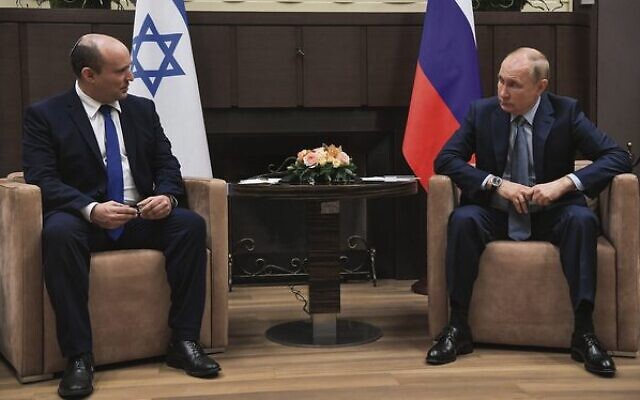Flying Israel into the eye of the Russia-Ukraine storm
IN a trip with extraordinarily high stakes, Prime Minister Naftali Bennett brought Israel to the centre of the world stage on Saturday, by flying to Moscow for talks on the Ukraine crisis with Russian President Vladimir Putin.
The Prime Minister’s Office on Saturday night stated that what turned out to be a three-hour meeting at the Kremlin was held “in coordination and with the blessing of the US administration”, which has continually sought a diplomatic resolution to Russia’s invasion, and in coordination too with Germany and France.
As the former foreign minister Tzipi Livni immediately noted on Channel 12 news, American backing “was critical”.
Bennett’s office also said he was working “in ongoing dialogue with Ukraine”.
Officials close to the Prime Minister denied Hebrew media reports that Ukrainian President Volodymyr Zelensky, who knew the trip was imminent, refused to take a call from Bennett on Friday, and Bennett indeed spoke with Zelensky immediately after departing the Kremlin, even before taking off from Moscow en route to Germany to brief Chancellor Olaf Scholz.
It was Zelensky who asked Bennett in a February 25 phone call to try to mediate in the crisis, and Bennett expressed readiness to do so in a call with Putin two days later. (Zelensky had reportedly asked Bennett to try to help when the Prime Minister last met with Putin, in Sochi, in October.)
But Zelensky in recent days has made plain his disappointment with Bennett’s stance on the invasion, telling reporters on Thursday that “I don’t feel that he [Bennett] is wrapped in our flag.” Although Israel is providing humanitarian aid to Ukraine, the Prime Minister has not directly condemned Russia, did not co-sponsor the United Nations Security Council resolution doing so, and reportedly refused a direct request from Zelensky for military aid.
The trip had been taking shape since midweek but, atypically, was not leaked. Bennett flew by private jet, reportedly over Turkey, accompanied by key officials. Ukraine-born Ze’ev Elkin, the minister of housing, performed the role of translator he frequently played at such meetings when Benjamin Netanyahu was prime minister.
Early reports of what was discussed in Moscow were unsurprisingly short on specifics. One official said Bennett spoke with Putin about the situation of Israelis and Jewish communities in Ukraine amid the conflict, and they also discussed the reportedly imminent revival of the 2015 nuclear deal with Iran – a development Bennett openly opposes.
Unsourced and unconfirmed Hebrew media reports suggested that Bennett raised the imperative to ensure safe and smooth passage from Ukraine, and from Russia, for Jews seeking to immigrate to Israel. Putin was said to have told Bennett not to provide Ukraine with anti-aircraft, anti-missile, or any other kind of weaponry.
That Bennett, Israel’s first Orthodox prime minister, flew to Moscow on Shabbat underlined his conviction that his mission has the potential to save lives – and thus to take precedence, in accordance with Jewish religious law, over Sabbath observance. The open question is whether he can indeed somehow contribute to a restraining of Russia’s military activity, and an earlier and less bloody conclusion to the war.
If Bennett’s mission leads nowhere, and worse, if he incurs the further displeasure of the free world’s most popular head of state, the Prime Minister may come to conclude he should have stayed home this Shabbat. Already, his insistence on attempting the almost impossible – trying to maintain not neutral but warm relations with both sides in a war – is threatening to exasperate the US and has the potential to deeply harm Israel’s standing in the free world.
If he somehow brokers life-
saving progress, by contrast, he will have performed a remarkable service.
Putin has repeatedly insisted he intends to demilitarise and “denazify” Ukraine, while also demanding it not join NATO. Ten days into his invasion, he has ratcheted up his rhetoric – warning that any countries tempted to establish a no-fly zone would be considered enemy combatants, comparing the mounting sanctions to a declaration of war, and telling Ukraine’s leaders they “risk the future of Ukrainian statehood” if they continue to resist him.
In short, Vladimir Putin is not sounding like a man inclined to compromise. Will Israel’s Prime Minister – delivering messages from the West while trying to bring his own added value – be able to change that?
TIMES OF ISRAEL
David Horovitz is the founding editor of Times of Israel.


comments